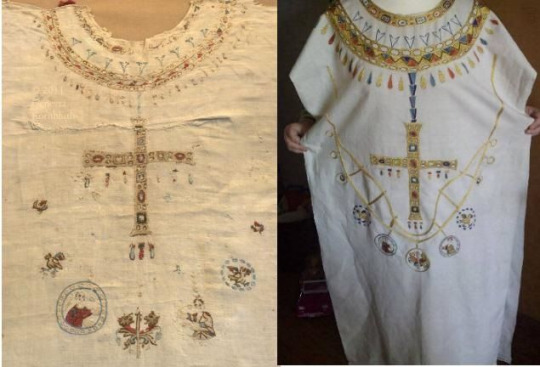#bathildis regina
Note
I was wondering whether you think Bathildis regina voluntarily retired as regent or whether court factionalism caused her too?
Hello, anon ! I think it's both.
First of all, we know for sure that a lot of things happened before her official retirement, such as the death of one of her most closest allies, Bishop Sigobrandus of Paris, who was allegedly killed for being a bad influence over her and the regency council (at least that's what he was blamed for, but to me, it mostly sounds like a later wrapped-up justification from some chroniclers to explain why that man was killed, and defend in the same time the memory of "Good Blessed Saintly Queen" Bathildis, who was already an important saintly figure at that time). And from that specific mention, we can draw the conclusion that Bathildis indeed lived in a complicated time, with a lot of tension and political schemes, and then conclude that she was ultimately forced to retire herself by some combination of court factionalism.
That's at least the opinion of the majority of historians. But I personnaly find that proposition quite inaccurate and a little bit too deminishing, especially if we see the result as : a woman who is once again submitted by some men and forced to withdraw herself despite her own will.
I also think that the historical figure of Ebronius, her well-known nemesis in the eye of many historians, is a very easy scapegoat if we alledge the fact that he was a very hated man in his time for being from a non-aristocratic background and that his memory has been the object of a damnatio memoriae for centuries now. Of course, it's tempting to blame him for being the sole perpetrator of Bathildis' removal from the court, and her ultimate retreat in the Abbey of Chelles, like if she was imprisoned or exiled for good. But I think we need to see beyond that.
My take on this specific matter is different: for me, Bathildis was just acting like any other women of authority of her time and most of all, she was wisely presenting herself as the anti-Brunehilde.
Let me explain this: Brunehilde was a very influential figure during her first time as a regent, but both her downfall and death were a very gruesome proof of what could possibly happen to a woman who defy the laws of her gender. Indeed, what ultimately works against Brunehilde was that she was seen as transgressing figure who coopted power from men, i.e. her son, grandsons and great-grandsons. No matter how good her relationships with them were, or how relatable she was towards them, she was seen by others as a woman who was refusing to submit to public withdraw of senior women and widows, and alledgely mingled in political matters whereas she was strongly advised not to do so. And so by that, she litterally created a force of opposition against her: at the moment of her death, she was seen as a bad queen, which later wow her to be labelized as a Jezebel-like queen, the most insulting parallel someone can draw to describe a royal woman's behavior.
On the contrary, Bathildis removed herself from public view and litterally abided by the principles of her gender, letting her sons ruled by themselves whithout being an overly controlling figure like Brunehilde was herself and thus being a more discreet figure. Therefore, she marked herself as an anti-Brunehilde, consciously or not as we don't know for sure if she was really working on a strategy or no. Furthermore, it's really important to note that in some sources, Bathildis is also presented like a Jezebel figure and a bishop's killer, meaning that at some point, Bathildis' power was perhaps seen as an emulation of Brunehilde's controversial figure. Therefore perhaps explaining why she chose to retreat in order to prevent her to be harshly treated like Brunehilde had been…
4 notes
·
View notes
Text

According to Vita S. Bathildis, Balthild was born circa 626–627. She was beautiful, intelligent, modest and attentive to the needs of others. Balthild was sold into slavery as a young girl and served in the household of Erchinoald, the mayor of the palace of Neustria to Clovis. Erchinoald, whose wife had died, was attracted to Balthild and wanted to marry her, but she did not want to marry him. She hid herself away and waited until Erchinoald had remarried. Later, possibly because of Erchinoald, Clovis noticed her and asked for her hand in marriage.
Even as queen, Balthild remained humble and modest. She is famous for her charitable service and generous donations. From her donations, the abbeys of Corbie and Chelleswere founded; it is likely that others such as Jumièges, Jouarre and Luxeuil were also founded by the queen. She provided support for Saint Claudius of Besançon and his abbey in the Jura Mountains.
Balthild bore Clovis three children, all of whom became kings: Clotaire, Childeric and Theuderic.
When Clovis died (between 655 and 658), his eldest son Clotaire succeeded to the throne. His mother Balthild acted as the queen regent. As queen, she was a capable stateswoman. She abolished the practice of trading Christian slaves and strove to free children who had been sold into slavery. This claim is corroborated by Jane Tibbetts Schulenburg, who mentions that Balthild and Saint Eloi “worked together on their favorite charity, the buying and freeing of slaves”. After her three sons reached adulthood and had become established in their respective territories (Clotaire in Neustria, Childeric in Austrasia, and Theuderic in Burgundy), Balthild withdrew to her favourite Abbey of Chelles near Paris.
Balthild died on 30 January 680 and was buried at the Abbey of Chelles, east of Paris. Her Vita was written soon after her death, probably by one of the community of Chelles. The Vita Baldechildis/Vita Bathildis reginae Francorum in Monumenta Germania Historica, Scriptores Rerum Merovincarum, as with most of the vitae of royal Merovingian-era saints, provides some useful details for the historian.
#saint balthild#balthilda#balthild of ascany#balthild of ascania#merovingian#french history#frankish#clovis ii#historical#history#history edit#history edits#edit#emma booth
17 notes
·
View notes
Photo








history ♦ Himnechildis Regina & Bathildis Regina (for @queenfredegund)
Sources: Liber Historiae Francorum, 44. in B. Krusch (éd.), MGH SRM, II, Hanovre (1888), p. 316-317 // Fredegar, Chronica, Cont., 1. De Baldechilde, regina Chlodovechi, et eius filiis Chlothario, Childerico et Theuderico, et de obitu Chlodovechi in B. Krusch (éd.), MGH SRM, II, Hanovre (1888), p. 168 // Anonymous, Vita Sanctae Bathildis in B. Krusch (éd.), MGH SRM, II, Hanovre(1888) // Diplomata Regum Francorum e stirpe Merowingica in K. Pertz (éd.), MGH DD, I, Hanovre (1872).
#historyedit#perioddramaedit#himnechildis regina#bathildis regina#mine#*#i'm constantly debating whether or not i should put in under perioddramaedit or not#but people reblog it anyway as such even when I don't???
158 notes
·
View notes
Note
How would you rank each Merovingian regina based on the following; 1. Your personal favourites also love to know why 2. Political influence.
Each of them, oh it would be very long, haha, so I will go for some top 5 (in no particular order):
Fredegund ♥♥: unmatched! I love her unusual path, her strong will throughout her whole life, and I find her personal life really moving, with a loving husband and too much sons who died in infancy... Poor woman needs a hug!
Sichildis: probbaly the bitchiest of the bitchies, but it's really apalling to me to see how underrated she is actually despite her important and controversial role in her lifetime. I think she deserves way more attention than that!
Bilichildis I: a former slave who rose to royal consort status and was regarded as a political ally, even among high-ranking courtiers, should I say more? Theodebert really did her dirty, and I'm pretty sure his later fate after her death is pure karma!
Nantechildis: an other underrated woman, because she had everything in her hands, even during Dagobert's lifetime, and she could have been so much more if only she didn't died so early during her son's regency. Truelly, she was made for being another powerful regent.
Brunehilde: because she's Brunehilde! No matter how hard people try to present her as Fredegund's nemesis, I'm calling for share respect and appreciation of these two incredible women.
Regarding the political influence, this is quite difficult to estimate because we often lack of many details to appreciate the entourage in a more complete aspect, but I think these women can be seen as the peak influential at one point during their lives:
Chlodechildis I, consort to Chlodovech I: probably the most powerful woman of her time, who litterally commanded bishops and kings (her sons). I think we can presume of just an inch of what was actually her whole legacy, because the way she's whorshipped as a sainted figure in som randoms french villages says a lot about the impression she had left behind her.
Brunehilde, consort to Sigebert I: at some point in Gregory of Tours' chronicle, there is an allusion about how influential she was even during the lifetime of her husband, and that some austrasian aristocrats grew jealous of her, because she was able to intercede and speak in the name of her protegees. This is also one of the few merovingian reginae about which we can estimate the personal circle, as we know she had a goddaughter, or that she was a good friend to some poets or courtiers.
Bathildis, consort to Chlodovech II: I already explained in another post [X] how I think that Bathildis achieved so much influence that she was on the verge of becoming a second Brunehilde, and so allegedly had to step back to protect herself.
Bilichildis I, consort to Theodebert II: again, she was really an important royal intercessor, and was apparently taken in consideration regarding political and diplomatic matters, as far as becoming Brunehilde's equal in correspondence exchanges. I think it tells a lot!
Fredegund, consort to Chilperich I: because no matter how many times some people tried to overruled her or diminished her, she always found her way to stay at the top. And as far as I think she was able to fend for herself, we shouldn't imagine that this kind of longevity can exist without true and strong connections. Fredegund had always been very influential among Chilperich's court, and I will add to this that it's actually not sure he became monogamous for her (at least it's a good hypothesis, regarding the fact he wasn't one either in their previous relationship), but she surely was the one and one only to gave birth to his sons after the 560s. So in some way, she was totally ruling his family.
3 notes
·
View notes
Photo






MEROVINGIAN REGINAE | Bathildis Regina († 680)
Chief wife of Chlodovech II Rex, to whom she bore at least three sons, Chlothacar III Rex, Childerich II Rex and Theodorich III Rex. According to Fredegar, she was an anglo-saxon or a saxon slave, bought and trained by the Maior Palatii Erchinoald, who then offered her to Chlodovech II Rex.
“Quam de partibus transmarinis divina providentia advocans, et vili pretio venundata, huc advenit ipsa pretiosa et optima Dei margarita. Recepta est a principe Francorum viroque inlustri Erchinoaldo quondam, in cuius ministerio ipsa adolescens honestissime conversata est [...]. Et cum esset ex genere Saxonum, forma corporis grata ac subtilissima et aspectu decora [...]. Et cum talis esset, fuit omnino grata principi et invenit gratiam in oculis eius. Qui eam instituit, ut sibi in cubiculo pocula porrigeret et ut pincerna honestissima sepius presens adstaret in ministerio eius.
Divine providence called her from lands across the sea and this precious and best pearl of God arrived here, having been sold at a low price. She was acquired by the late Erchinoald, the leader of the Franks and a man of illustrious standing [...]. And although she was from the race of the Saxons, the form of her body was pleasing, very slender, and beautiful to see. [...] And, since she was thus, she was exceedingly pleasing to the prince and she found favour in his eyes. He engaged her to serve him the goblets in his chamber, and as a most honourable cupbearer she stood quite often present in his service.”
Vita Bath., A, c. 2.
Very little is known on the next fifteen years of her life. As Chlodovech II’s wife, she may have lived between the cities of Sexonas (Soissons), Parisius (Paris) or Clippiacum (Clichy). And as his ancient slave, she maintained good relationships with Erchinoald, who favoured her in return. It is unknown if she was the only sexual partner of Chlodovech, but she seems to have been the only one to gave birth to sons able to succeed him.
Igitur Chlodoueus filius Dagoberti, de genere alienigenarum reginam accipiens nomine Baldethilde prudentem atque eligantem, genuitque ex ea filios tres Chlothario, Childerico et Theuderico.
Then Clovis, son of Dagobert, took for queen a woman of foreign birth, named Balthild, wise and distinguished woman, of which he had three sons, Clotaire, Childéric and Thierry.”
Chron, Cont, 1.
After the suddent death of Chlodovech II in 657, she became Regent of Neustria for her son Chlothacar III Rex only, who was still a minor by then, without crowning any of her other sons. According to Fredegar, she was supported in her choice by Erchinoald, who wanted to avoid a dismembering of the regnum, and thus, the appointment of an other Maior Palatii to challenge him.
“In extremis uero uitae annis amens effectus uitam caruit regnauitque annis XVIII. Franci quoque Chlotharium filium eius maiorem in regno statuunt cum prefata regina matre.
In the last years of his life, however, he lost his mind and passed away after he had reigned eighteen years. The Franks then place on the throne his eldest son, Clotaire, next to his mother, the queen mentioned above.”
Chron, Cont, 1.
She also formed around her a circle of importants and powerful councellors, like Bishop Chrodobert of Parisius, Bishop Audoenus of Rotomagus, or Bishop Eligius of Noviomagus. Yet, a year later, she had to face the death of her old protector, who was replaced by the decision of the nobiles by a certain Ebroinus. As a ruler, she was known for her religious foundations and her abolition of the slave trading of Christian people in the whole Gauls.
“Et illus commemorandum est, quia ad mercedis eius cumulum pertinet, quod pativos homines christianos ire prohibuit, datasque praeceptiones per singulas regiones, ut nullus in regno Francorum captivum hominem christianum penitus transmitteret. Sed magis et ipsa, dato prestio, captivos plurimos redimere precepit et liberos relaxavit et alios ex ipsis in monasteria intromisit et precipue de gente sua viros et puellas quam plures denutritas suas. Quantas enim adtrahere potuit, eas per sancta coenibia commendavit et, ut pro ea exorarent, eis precepit. Etiam ad Romam usque ad beati Petri et Pauli basilicas vel ad Romensis pauperes plura ac larga sepius direxit munera.
And this must be called to mind, because it pertains to the increase of her reward, that she forbade Christian men to become captives, and she issued precepts throughout each region [ordering] that absolutely no one ought to transfer a captive Christian in the kingdom of the Neustrians. And in addition she paid the price and ordered many captives to be bought back and she released them as free. Others of them, especially from her own race, men and also many girls, she sent into the monasteries as her own charges. However many she was able to attract, these she entrusted to the holy monasteries, and she ordered them to pray for her. She even often sent many generous gifts to Rome, to the basilicas of blessed Peter and Paul and to the Roman poor.”
Vita Bath., A, c. 9.
She also intervened in Austrasia, where a coup d’etat had occured a year before in the following of the death of her brother-in-law, Sigebert III Rex: although it remains difficult to understand what truly happened by then, it may have been due to a violent competition between two alleged regents, Himnechildis Regina, mother of Dagobert II, and the Maior Palatii Grimoald, tutor of Childebert III, a competition which led to the victory of the last over the first.
However, fearing the threat of the new masters of the austrasian kingdom, Bathildis and Ebroinus sent troops to Mettis (Metz), leading to the death of Grimoald and the overthrowing of the young Childebert III. After that, she installed her second son Childerich II Rex as rex over Austrasia, in 662, under the regency of his aunt, Himnechildis Regina.
“[...] et regno quidem Francorum in pace consistenti. Tunc etenim nuper et Austrasii pacifico ordine, ordinante domna Blathilde, per consilium quidem seniorum receperunt Childericum, filium eius, in regem Austri [...].
And, indeed, the kingdom of the Franks was maintained in peace. Then indeed, a little while ago, the Austrasians peacefully received her son Childeric as king in Austrasia by the arrangement of Lady Balthild and, indeed, through the advice of the great magnates.”
Vita Bath., A, c. 5.
C. 664, as her son Chlothacar became a major, she officially retired herself of her rank of regent and also of the public life in the monastery of Cala (Chelles). Even if some scholars claims till this day that she was forced to do it by the villainous Ebroinus, probably because of a factions clash, it is rather the application of a social norm for royal widows as the sources speak of a sort of aristocratic procession, already observed for Fredegund Regina in 584.
“Erat enim eius sancta devotio, ut in monasterio, quem prediximus, religiosarum foeminarum, hoc est in Kala, quam ipsa edificavit, conversare deberet. Nam et Franci pro eius amore hoc maxime dilatabant nec fieri permittebant [...]. Deductaque ab aliquibus senioribus, venit ad praefatum monasterium suum Kala, ibique ab ipsis sanctis puellis, ut decebat, honorifice et satis amabiliter in sancta congregatione recepta est.
It was, however, her holy vow that she ought to dwell in the monastery of religious women which we mentioned above, that is, at Chelles, which she herself built. But the Neustrians, for love of her, delayed in this especially [...]. And, having been escorted by certain noblemen, she came to her above-mentioned monastery at Chelles, and there, as is fitting, she was honourably and very lovingly received into the holy congregation by the holy maidens.”
Vita Bath., A, c. 10.
After that moment, Bathildis apparently did not intervene in politics anymore, even during the turmoil of events which led the end of her regency: the death of Chlothacar c. 666, the aristocratic conspiracy against Ebroinus in 673, or the assassination of Childerich in 675. She died as a saint in 680, shortly after her goddaughter, who had followed her in her retirement, during the reign of her third son, Theodorich III Rex, and was buried in the church Holy-Cross of Cala.
“Et erat aliqua quidem tunc infantula, sua filiola, quam voluit, ut secum iret, quae et ipsa subito e corpore exiit et eam ad tumulum pracessit. Tunc consignans se confidenter, et pios oculos ac santcis manibus ad caelum erectis, sancta illa anima a corporis vinculo in pace soluta est [...].
There was at that time a certain child, her goddaughter, whom she wished to go with her, and she [the child] suddenly went out from her body and preceded her to the grave. Then, making the sign of the cross in faith, and with her faithful eyes and holy hands raised toward heaven, her holy soul was loosed from the chain of her body in peace. [...].”
Vita Bath., A, c. 14.
Some of her possessions have been kept in the actual Chelles Abbey, such as an ornate chemise and a lock of hair which, if it is really one of her own hair, shows to us that she was actually a strawberry blonde and, above all, a dyed strawberry blonde as it has been demonstrated that they are traces of dye coloration on it.


#historyedit#perioddramaedit#women in history#merovingian queens#merovingian reginae meme#bathildis regina#merovingian period#7th century#mine#working on bathildis' era is a nightmare#too much discordance in the sources#and the timeline is a roller-coaster#this is frustrating because this is a really interesting period!
94 notes
·
View notes
Note
Hi! Could you please tell me more about the times when Brunehilde and Fredegund led armies? Thank you so much :)
Sure! First of all, we don’t have lots of account of these two being directly involved in war matters like conducting armies to battlefront, they have duces and patricii for that, but they may have been in charge for some specific events in which they had to represent a military authority, as regents.
First example happened in 581. Brunehilde, regent for Childebert II (11 at that time, still a minor as majority was effective c. 13/14), had to face a difficult shift of power inside the government after the death of the powerful nutritor Gogo: Gogo’s ally, the dux Lupus, became chased by other officials, such as Berthefredus and Ursio, two powerful men, and nearly killed by them. Even if Berthefredus was in fact one of her allies (she was the godmother of her daughter), Brunehilde decided to intervene and protect Lupus. According to Gregorius of Tours:
“Lupus vero dux Campanensis, cum iam diu a diversis fategaretur et spoliaretur assiduae et praesertim ab Ursione et Berthefredo [...]. Quod cernens Brunichildis regina, condolens fidelis sui insecutiones iniustas, praecingens se viriliter, inrupit medios hostium cuneos, dicens: ‘Nolite, o viri, nolite malum hoc facere, nolite persequere innocentem; nolite pro uno hominem committere proelium, quo solatium regionis intereat’.
Lupus, Duke of Champagne, had long been harassed and despoiled by those who were hostile to him, especially Ursio and Berthefried. [...] When Queen Brunhild learned of this, she was greatly incensed at the wrongs being done to her faithful supporter. She girded herself manly, then burst into the midst of enemy lines saying: ‘Stop!’ she shouted. ‘Warriors, I command you to stop this wicked behaviour! Stop harassing this person who has done you no harm! Stop fighting each other and bringing disaster upon our country, just because of this one man!’”
DLH, VI, 4. Qualiter Lupus a regno Childeberthi fugatus est
Technically, she didn’t acted as a real warlord, but we see the way she demonstrated her authority, especially in the way she is described (praecingens se viriliter), because she endorsed a manly quality, i.e. an authority as a regent. And she succeded in her intention and prevented the death of Lupus.
Even if Gregorius doesn’t mention it clearly, we know what it implied when he speaks about the way she is “girded herself” i.e., the famous cingulum, a belt which was a part of the military equipment during the Roman republic and empire, an element which eventually might have became an element worn by female regents from the merovingian dynasty: a century later, Bathildis, widow of Chlodovech II and regent for Chlothacar III, wore also a cingulum that she eventually offered to the monastery of Curbione, as a pious donation for alms (Vita Bath, A, c. 8). It may have been a symbol of military authority and personification of royal power as reges, duces and maiores palatii also worn it.
Second case is Fredegund, but it’s a little bit spurious as it only happened in the Liber Historiae Francorum, who also says that she killed Chilperich after she mixed him up with her lover while washing her hair, so.... \_(ツ)_/¯
Anyway, the LHF tells us the story that while being of the verge to attack his opponents, Ebroinus visited Bishop Audoenus of Rotomagus (Rouen), searching for his advices, and the religious man said to him “Remember of Fredegund!” as a some sort of tactical advice (LHF, 45), apparently refering to a battle in Trucia (Droizy) she led with her young son against the Austrasian armies (LHF, 36). In the telling, she is specifically described as travelling with the armies with the youn Chlothacar (around 8/9 years at that time), same goes for the way she is attacking Parisius (Paris) later in the reign (Chron, IV, 17):
“Cum dedicisset quod nimis esset exercitus Austrasiorum coniuncitis simul, consilium dedit Francos qui cum ea erant, dicens : « De nocte consurgamus contra eos cum lucernis, portantes socii qui nos precedunt, ramis silvarum in manibus, tintinnabolis super equos legatis, ut nos cognoscere ipsorum vigiles custodes hostium non queant. Inluciscente inicium diei, inruamus super eos, et forsitan eos devincimus. » Placuitque hoc consilium. Cum denunciatum fuisset placitum qua die ad preliandum in loco nuncupante Trucia in paygo Suessionico convenire deberent, illa, sicut consilium dederat, de nocte consurgens cum armorum apparatu, cum ramis in manibus vel reliqua quae superius diximus, ascensis equitibus, Chlothario parvolo rege in brachia vehitans, usque Trucia pervenerunt.
When [Fredegund] heard that the Austrasian army was very numerous, she gathered the Franks who were with her, held a council with them and said to them: “Let us approach them at night with torches; those of us who are ahead will hold tree branches in their hands, and bells will be tied to the horses, so that the night watchmen of their host cannot recognize us. And when the dawn breaks, we will come upon them, and maybe we will defeat them.” This plan suited them. While an agreement had been reached on the day when the armies should meet for combat at a place called Droizy in the pagus of Soissons, they set out at night, following the advice she had given, equipped with their weapons, with branches in their hands and with the other stratagems mentioned above; the riders being mounted on their horses, and the queen carrying in her arms the little king Clothar, they reached Droizy.”
LHF, 36. Ubi Fredegundis bellum cum Austrasiis ergit, eosque devictos Campaniam succendit
“Eo anno Fredegundis cum filio Clothario regi Parisius uel reliquas ciuitates rito barbaro occupavit et contra filius Childeberti regis Teudeberto et Teuderico movit exercitum loco nominante Latofao.
This year, Fredegund with her son, King Clothar, barbarically invests Paris as well as other cities, and she marched an army against the sons of King Childebert, Theudebert and Theuderic, in a place called Laffaux.”
Chron, IV, 17. De Fredegunde, quod Parisius invasit, et pugna contra Teudeberto
I absolutly don’t know how much we can give credit to these accounts, but it seems to have been a great story even among the Frankish noblemen. Don’t know if we could take it for granted, but I quite like the idea of a Fredegund seen as a model of power-ruling and tactics among the Franks.

#ask#encyclopedia-amazonica#women in history#fredegund regina#brunehilde regina#merovingian period#6th century#7th century#not so much about this i'm affraid#but the few is already interesting :)
39 notes
·
View notes
Photo






MEROVINGIAN REGINAE | Chlodechildis V Regina († af. 692)
Principal wife of Theodorich III Rex, to whom she bore at least two sons, Chlodovech III Rex and Childebert III Rex. Possibly a daughter of the Maior Palatii Ansegiselus and his wife Begga, her dates of birth and death are unknown. Despite the fact that she was certainly from a powerful family, little is known about her life. She lived in a time of great political agitation, and her husband was constantly in the middle of a fight of influence over the Gauls.
The son of Chlodovech II Rex and Bathildis Regina, Theodorich indeed reached the throne after the death of his brother, Chlothacar III Rex, and ruled for a unknown amount of time, as the sources are mostly silentious on that matter. In 674/675, he was officially deposed by a revolt of the nobiles led by Bishop Leodegar, and replaced by his brother, Childerich II Rex.
“Eo tempore Franci adversus Ebroinum insidias praeparant, contra Theudericum consurgunt eumque a regno deiciunt. […] Propter Childericum in Auster legacionem mittunt. Una cum Vulfoaldo duce veniens, et eum super cuntum regnum suscipiunt.
At that time, the Franks plotted a plot against Ebroin, rose up against Theuderic and drove him from the throne. […] They address an embassy in Austrasia near Childeric. This one comes with Duke Vulfoald and they put him at the head of the whole kingdom.”
Chron, Cont. 2. De obitu Childerici et Billchilde reginae, et Leudesius, filius Erchanaldis, maiorum domum efficitu
It is unknown if Chlodechildis V Regina was already his wife at that time, as her fate was not recorded during that period of anarchy. In 675, after his brother had been assassinated with his wife, Bilichildis II Regina, Theodorich came back on the throne, and ruled as rex over the Neustria until 679, then sole rex over the whole Gauls until his own death c. 690.
It is also difficult to determine if Chlodechildis was his sole wife, as Theodorich may have had an other concubine, known as Doda, and is sometimes referred as the father of Bertrada, grandmother of the future Charlemagne, who then would have been the daughter of an unknown mother.
In 690, at Theodorich’s death and because their first son Chlodovech III Rex was still underage, Chlodechildis established herself as the regent on his behalf until 692, when Chlodovech died, still a child. After the coronation of her other son, she somehow disappeared from the sources, probably because she had retired herself from her duty.
“Obiit autem Theudericus rex; regnavit annis XIX. Chlodoveus filius eius puer regalem sedem suscepit, ex regina nomine Chrodchilde progenitus. Nec multo post ipse Chlodoveus rex puer mortuus est, regnavitque annis II. Childebertus frater eius, vir inclytus, in regno statutus est.
King Theuderic died after nineteen years of reign. His young son Clovis, whom he had from Queen Clotilde, rose to the throne. But, shortly after, King Clovis died, still a child; he had reigned only two years. His brother Childebert, a distinguished man, was brought to royalty.”
LHF, 39. De obitu Theuderici et regnum Chlodovechi et Childeberti et Grimoaldo maiorum domo
#historyedit#perioddramaedit#women in history#merovingian queens#merovingian reginae meme#chlodechildis v regina#7th century#mine
44 notes
·
View notes